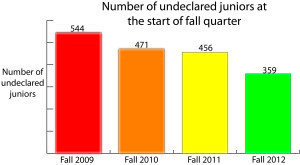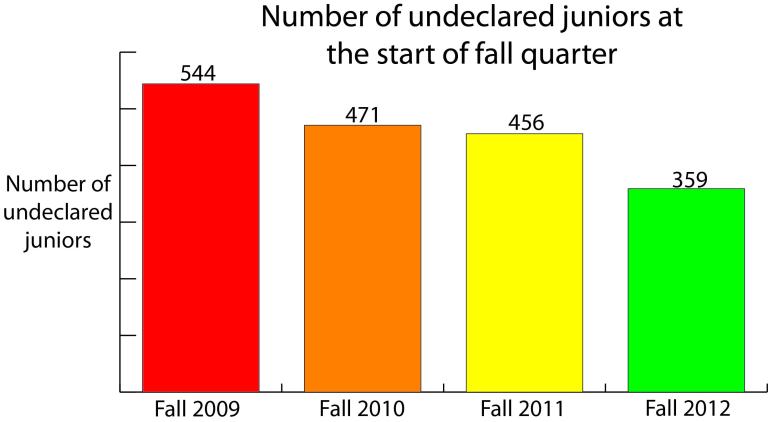Efforts by Undergraduate Advising and Research (UAR) to ease students’ uncertainty when choosing a major, including events like Majors Night, have led to a decrease in the number of juniors who are undeclared entering fall quarter, from 544 in 2009 to 359 this year, according to Koren Bakkegard, associate dean of UAR.

In recent years, UAR has dedicated more resources to sophomores, such as adding academic directors who cater to sophomores’ advising needs. Changes to iDeclare Week and Majors Night and a quarterly enrollment hold to ensure that sophomores meet with their pre-major advisors until declaring a major are the latest measures.
UAR hosts Majors Night each year to introduce freshmen and sophomores to department faculty as a point of access to more resources for informed decisions about declaring a major. This year, Majors Night will be held at Paul Brest Hall in Munger Graduate Residences from 7 p.m. to 9 p.m. on Oct. 2.
In previous years the event was held at Toyon Hall. According to Bakkegard, the move to the less frequented, but larger Paul Brest Hall will allow for more open space for the estimated 700 to 800 students to walk around.
In response to low attendance at iDeclare Week, another event geared at helping sophomores declare, UAR teamed up with the sophomore class presidents to create a month-long series of events to replace its weeklong predecessor.
“This year we’ve decided to spread it out so students could feel as if they could go to more events,” Bakkegard said.
UAR’s efforts aim to alleviate some of the pressures that delay students from declaring their majors.
“Given the economic environment, students perceive that there is a steady correlation between one’s major and the future career path, and that career to their level of happiness,” Bakkegard said, proposing an explanation to why students delay declaring. “Students fear that when they declare their major, it decides the rest of their lives.”
Charlie Fierro ‘13 agrees with this hypothesis. He attributed his delay to being a “commitment-phobe.” Fierro went undeclared throughout most of his first three years. He moved from thinking of himself as an eager chemistry major to an uncertain physics major to a non-science major, until finally settling into computer science.
Fierro said that, as a freshman, he made the mistake of diving straight into chemistry before exploring more options. He now believes that the first two years should be used for more exploration.
“It takes a long time, but eventually you’ll get there,” Fierro said.
Jessica McCallum ‘14 had dual interests in biology and mechanics and went Majors Night last year certain of wanting a major that had “something to do with mechanical engineering.”
Although McCallum was disappointed to find limited information on specific majors, she found it helpful to compare similar majors, such as biomechanical engineering, mechanical engineering and bioengineering.
Rachel Lee ‘15 spent her summer exploring Stanford’s resources.
“As a freshman, it’s difficult to actually understand program sheets, and often times there is no uniform way the school presents each major, so I was majorly stressed,” Lee wrote in an email to The Daily.
Lee stated she did not plan on going to Majors Night but recommended undeclared students speak with student service officers, who pointed her in the right direction.
“Your employers won’t care that much about what major as much as what you do; that’s a wonderful reality to embrace,” Lee said.
